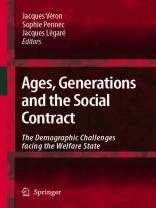Our societies are ageing. The Family is changing. Labour force behaviour is evolving. How is the organisation of family and collective solidarity adapting in this context of longer life spans, low fertility, and work that is simultaneously scarce and abundant?
The welfare states are currently facing three main challenges: ensure satisfactory living conditions for the elderly without increasing the cost burden on the active population, reduce social inequality, and maintain equity between successive generations.
In this book, researchers from different countries compare their experiences and offer contrasting views on the future of social protection. They consider the theoretical aspects of the intergenerational debate, relations between generations within the family, the living standards of elderly people, and the question of social time.
Зміст
Changing Background of Intergenerational Relationships.- Demographic Change, Welfare, and Intergenerational Transfers: A Global Overview.- Demographic Context of the Social Contract in Developed Countries: Unity and Diversity.- Generations, Social Contract and Labour Force Participation: Theoretical and Empirical Issues.- Economics of the Intergenerational Debate: Normative, Accounting and Political Viewpoints.- Reorganizing the Activity Cycle: The Stakes in a New Social Contract.- Social Contract and Age at Retirement: Some Elements of a Franco-American Comparison.- Longevity and Work.- Family and Relationships Between Generations.- Changes to the Legal Relationship Between Grandparents and Grandchildren in Quebec: A Disconcerting Evolution.- Demographic Change and the Social Contract of Informal Support Within the Family.- Change and Reciprocity in Intergenerational Relationships: The Discourse Of Spanish Working Mothers.- Intergenerational Exchanges in Older Populations.- Family Solidarities at the Beginning of Retirement in France.- Redistribution and Intergenerational Equity.- Pensions and Income Redistribution in a Comparative Perspective: Evidence from the Luxembourg Income Study.- Social Spending: Recent Changes and Conditions for its Long-Term Viability.- Pensions, Privilege and Poverty: Another “Take” on Intergenerational Equity.- Social Time.- Toward a 24-Hour Economy: Implications for the Temporal Structure and Functioning of Family Life.- Working Schedules: In Search of a Balance Between Family Time and Economic Wellbeing.- Determinants of Paths of Transition to Total-Work Retirement: A Preliminary Empirical Analysis.












